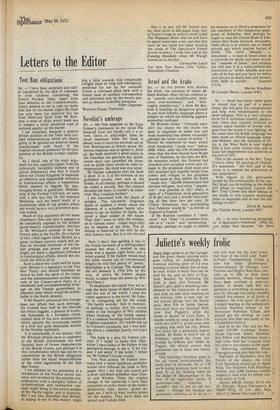Test Ban obligations
Sir, — I have been surprised and rather concerned by the lack of comment in your columns concerning the French Nuclear Tests. Apart from your editorial on the Commonwealth, which seemed to me to take no really firm line on the matter (April 28) there has only been the plaintive but far from irrelevant letter from Mr Bowater, a state of affair which leads one to suspect a fairly advanced case of national apathy on the matter. I am surprised, because a passive British position on the Tests (and civilised remonstrances which are clearly going to be ignored are passive) seems Irreconcilable with much of the original rationale produced by the proponents of the British nuclear capability. As I recall, one of the main argument for this capability (apart from the technically incredibly dubious one of actual deterrence) was that it would allow the United Kingdom to maintain an effective and responsible influence in International affairs, a supposition which seemed to beg_uile Sir Alec Douglas-Home in particular. Membership of the Nuclear Club was, we were told, a sine qua non for the renewed Britannia, and we heard much of a mysterious table of top powers where she would have a very prominent position indeed.
Much of this argument did not seem impressive then and now it appears to be completely exposed by the present government's unenthusiastic reaction to Mr Whitlam's attempt to ban the French tests in the Pacific. Asa matter of fact I still regard Great Britain as a great civilised country which still enjoys an enviable residuum of her former prestige and power, and which might yet exert a significant influence in international affairs, should she discover the will to do so.
Such a discovery could well be made now: Britain is a signatory to the Test Ban Treaty and should therefore be bound by both the spirit of the tredty and the aforementioned nuclear rationale of the Conservative Party to a maximum and uncompromising leverage on the French government to abandon tests which would be unthinkable in the North Atlantic.
If Mr Heath's adventure into Europe does not afford him such leverage, his crusade may well be the charade his critics suggest, a pursuit of economic fanatasies in a European cloudcuckoo land of his own orchestration which ignores the unwelcome reality of a slow but quite detectable erosion in the Nuclear stalemate.
It is remarkable, if not bizarre, that Mr Whitlam should have to represent to the British Government the well founded fears of former dependencies of the British Crown, and perhaps it is this circumstance which has led me to concentrate on the British obligation rather than the equal responsibilities of the other signatories of the Test Ban Treaty. I am alarmed by tile possibility of a breakdown of the Nuclear power bal
ance, and revolted by the possible conLamination even a marginal fallout of radiostrontium and radioactive caesium might bring to the native peoples of the Pacific region, and to Australia. But I. am also disturbed that Britain, in failing to act in this matter, might
slip a liftle towards that remarkable twilight state so long and confidently predicted for her by her unkinder critics: a confused place dark with a muzzy haze of national introspection and enlivened only by the erratic pursuit of obscure economic panaceas. Peter Chapman Brandon House, Tasmania.


































 Previous page
Previous page